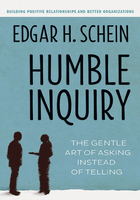
2. Getting departmental telephone costs down
(Using Humble Inquiry to get help from subordinates)
When I was the chair of my department of fifteen professors, I got a note from my dean that our phone costs were way out of line. I was told that I should find out what the problem was and get the costs down. I received a packet of information which provided a list of all the calls made by each faculty member, presumably to help me locate the problem persons and get them into line. So my job was to figure out what form of inquiry would yield the best result in terms of solving the problem.
Option 1 Go over with each professor her or his list of calls and find out which ones were legitimate and which were not.
Problems with this option:
 This would involve telling people they had a cost overrun problem and requiring a detailed explanation.
This would involve telling people they had a cost overrun problem and requiring a detailed explanation.
 This option would offend people, make them defensive, and actually reduce the chances of finding out what was really going on.
This option would offend people, make them defensive, and actually reduce the chances of finding out what was really going on.
Option 2 Go over the list myself, locate cases that looked out of line to me, and selectively call faculty members for explanations.
Problems with this option:
 This option would be very time consuming.
This option would be very time consuming.
 I would still run the risk of creating defensiveness.
I would still run the risk of creating defensiveness.
 My relationship with the faculty members would be undermined.
My relationship with the faculty members would be undermined.
Option 3—(Humble Inquiry) Focus on the goal of reducing the telephone bill without destroying my relationships with my faculty. For me to know who had gone out of line and why was not really important. To implement this option I asked my secretary to send each faculty member his or her list of calls accompanied by my memo saying that the Dean had told me that our costs were out of line. The memo then asked each faculty member to 1) look at her or his own list of calls to 2) determine whether he or she had calls that should have been on other accounts and 3) to monitor this in the future. I made it clear that I was not interested in looking at each list and that I trusted each faculty member to examine and correct telephone usage in his or her own office. Though it was quite prescriptive, it was, in effect, asking them to help me in solving the dean’s problem of cost overruns.
The important issue was for me to realize that I was dependent on them for the relevant information and to figure out what form of questioning would yield the best result in terms of solving the problem and, at the same time, enhancing the trust level between me and the faculty rather than risking offense and, thereby, reducing the trust level. Such offense could easily have resulted if every faculty member thought I was going over all his calls individually.
Why this option?
 It demonstrates my trust in faculty members to examine and correct telephone usage on their own, rather than risking offense and, thereby, reducing the trust level.
It demonstrates my trust in faculty members to examine and correct telephone usage on their own, rather than risking offense and, thereby, reducing the trust level.
 It is, in effect, asking them to help me in solving the dean’s problem of cost overruns.
It is, in effect, asking them to help me in solving the dean’s problem of cost overruns.
WHAT I LEARNED
 I had to reflect carefully on what I was really trying to do in a supervisory role before leaping into action.
I had to reflect carefully on what I was really trying to do in a supervisory role before leaping into action.
 I had to accept my dependency on others for the relevant information and be Here-and-now Humble, i.e., ask the faculty for help instead of telling them what to do.
I had to accept my dependency on others for the relevant information and be Here-and-now Humble, i.e., ask the faculty for help instead of telling them what to do.
 I had to figure out what kind of question would really provide the answer, and, more importantly, how to ask that question—in this case through a memo that also let people know that I was not interested in individual information.
I had to figure out what kind of question would really provide the answer, and, more importantly, how to ask that question—in this case through a memo that also let people know that I was not interested in individual information.
The method I ended up with did lead to several faculty letting me know that they had found out that some graduate students had made all kinds of long distance calls that should not have been on the department account. I felt good that they could come to me to tell me what they were doing rather than my having to ask them to tell me what they were doing.